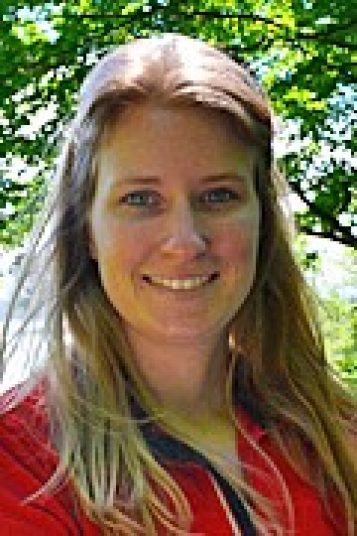What kinds of next steps are taken by students who complete their PhDs at Michigan Astronomy? We've asked some recent alumni to describe their research and share their perspectives on how the department helped them prepare.
For a more comprehensive list of recent alumni, please see our Alumni page in the People section.
PhD '24 | Vera C. Rubin Observatory Observing Specialist Postdoctoral Research Associate
During Kate's research, she discovered quasars strongly lensed by galaxy clusters are inherently rare systems, yet they provide many insights into astrophysics and cosmology.
Juliette Becker
PhD '19 | Assistant Professor, University of Wisconsin-Madison
During her PhD studies, Juliette and her colleagues discovered a hot Julipter system with two close-in planetary companions using data from the Kepler space telescope.
Erin May
PhD '19 | Senior Professional Staff, Johns Hopkins University
As part of her research, Erin used the Magellan telescopes to study the composition of the atmospheres of small gas planets.
.JPG.transform/regfree/image..JPG) Ilse Cleeves
Ilse Cleeves
PhD '15 | Assistant Professor, University of Virginia
PhD Breakthrough: Provided the first evidence that cosmic rays are not present as planets are born, which implies that Earth’s water first formed a million years prior to the birth of our Sun.
"The faculty at UM are well-connected and internationally recognized. Through these connections, I was able to build up an international team of collaborators in theory, observations, and lab work that have opened doors to exciting new research opportunities."
 Ashley King
Ashley King
PhD '14 | Lead Algorithms Engineer, Utilidata
PhD Breakthrough: Provided first evidence of a common driving mechanism for black hole winds across the mass scale.
“I was competitive for these fellowships because I had a number of first-author publications and 10 accepted telescope proposals. It showed that I could get time on instruments across the spectrum....”
 Catherine Espaillat
Catherine Espaillat
PhD '09 | Faculty, Boston University
PhD Breakthrough: The first to identify “pre-transitional” circumstellar disks, providing evidence for dust clearing due to planet formation.
“At Michigan, I honed the skills [I’ll need to] get grant money and support myself professionally.”
 Anne Jaskot
Anne Jaskot
PhD '14 | Assistant Professor, Williams College
PhD Breakthrough:Identified nearby galaxies that may hold the key to understanding the reionization of the early universe.
“The U-M Astronomy Department trained me in all aspects of what it means to be an independent scientist.”
Jessica Werk
PhD '10 | Assistant Professor, University of Washington
PhD '23 | Origins of Life Fellow, Harvard
During Jenny's research, she discovered the evolution of small dust as it settles to the midplane is needed to be taken into account in order to reproduce the bright emission that is seen from complex organic molecules in protoplanetary disks.
Bryan Terrazas
PhD '19 | Future Faculty Leaders Fellow, Harvard-Smithsonian Center for Astrophysics
Bryan studied the evolution of galaxies with stellar masses similar to that of the Milky Way by comparing and analyzing computational simulations and observations.
Traci Johnson
PhD '18 | Senior Computational Research Consultant, Northwestern University - Kellogg School of Management
During their PhD studies, Traci modeled strong gravitational lensing in galaxy clusters, the most massive structures in the universe and natural telescopes to the distant universe.
Vivienne Baldassare
PhD '17 | Assistant Professor, Washington State University
Vivienne studied supermassive black holes at the centers of dwarf galaxies. She used data from the Magellan telescopes to search for signatures of black holes consuming material at a vigorous rate.
Matt Walker
PhD '07 | Faculty, Carnegie Mellon University
PhD Breakthrough: Used Professor Mateo’s custom fiber spectrograph to challenge models’ predictions of centrally concentrated dark matter.
“By the end of my time at Michigan, I could walk into a conference and know I had the world’s best data set for the galaxies we looked at — ultimately that’s why I was attractive on the job market.”
 Ming Zhao
Ming Zhao
PhD '09 | Data Scientist, New York Times Company
PhD Breakthrough: Used Professor Monnier’s Michigan Infrared Combiner at CHARA to push the limits of interferometry, and became the first to resolve an interacting binary and several rapidly rotating stars.
“One of the reasons I came to U-M is because it has top experts in interferometry.”
 John Tobin
John Tobin
PhD '11 | Homer L. Dodge Endowed Chair in Astrophysics at the University of Oklahoma
PhD Breakthrough: Challenged conventional thinking about the shape and motion of gas clouds around protostars.
“U-M prepared me for the future because I was trained in so many observational methods... I know I’m prepared to take advantage of next-generation facilities.”
Zhaohuan Zhu
PhD '11 | Assistant Professor, University of Nevada-Las Vegas


